
Reading Time: 13 minutes
I want to buy a hybrid! Well, you’re not alone. Just last year, a game-changer rolled out! Toyota hybrid vehicles began offering an industry-first, fully integrated solar roof, significantly extending driving range. Now, when you buy a hybrid, it’s not just about saving fuel; it’s about harnessing the sun’s power too. As an industry expert, I’ve seen the shift. Hybrid cars for sale today are smarter and greener than ever before. In fact, opting for a Toyota hybrid or another eco-friendly model isn’t just good for the planet; it can be great for your wallet too. With improved mileage and lower emissions, hybrid cars for sale are winning hearts and budgets. So, if you’re mulling over whether to purchase a hybrid vehicle, let’s clear the fog.
Join me as we uncover the latest hybrid advantages that could sway your decision. Trust me; a year from now, you’ll be glad you caught this wave. Plus, with Nationwide Auto Transportation, you can get your green machine home with zero extra miles. Let’s go!
Are you intrigued by the rising stars on America’s roads? Here is our feature story, ‘The Rise of Popular Foreign Cars,! Here we explore how and why international auto brands are speeding ahead in the U.S. market. Discover what’s driving American consumers to embrace these global icons right here at home.
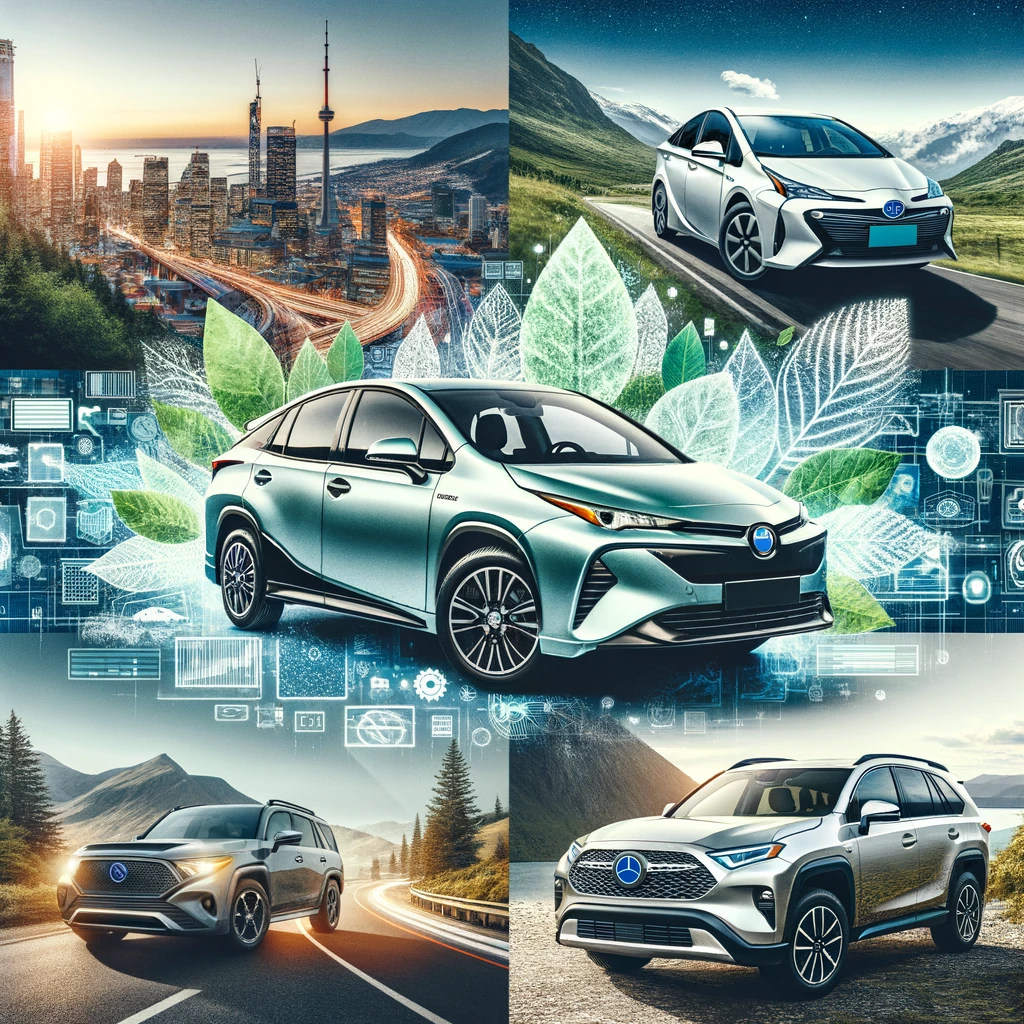
Hybrid Cars for Sale | What is a Hybrid Car?
Understanding Hybrid Cars for Sale | Your Path to Eco-Friendly Driving
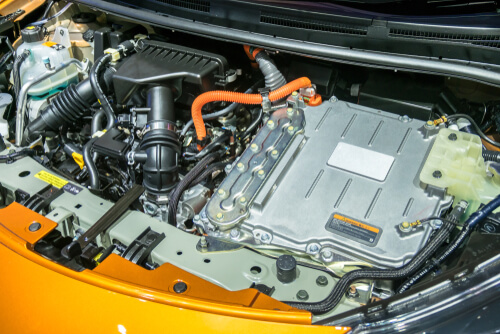
What Exactly is a Hybrid Car? At its core, a hybrid car marries a gasoline engine with an electric motor, delivering a more eco-conscious drive without compromising on power. As you think about buying a hybrid, imagine a vehicle that’s designed to optimize your fuel use and reduce emissions — it’s a choice that benefits both your budget and the planet.
The Many Faces of Hybrids | Hybrid cars for sale
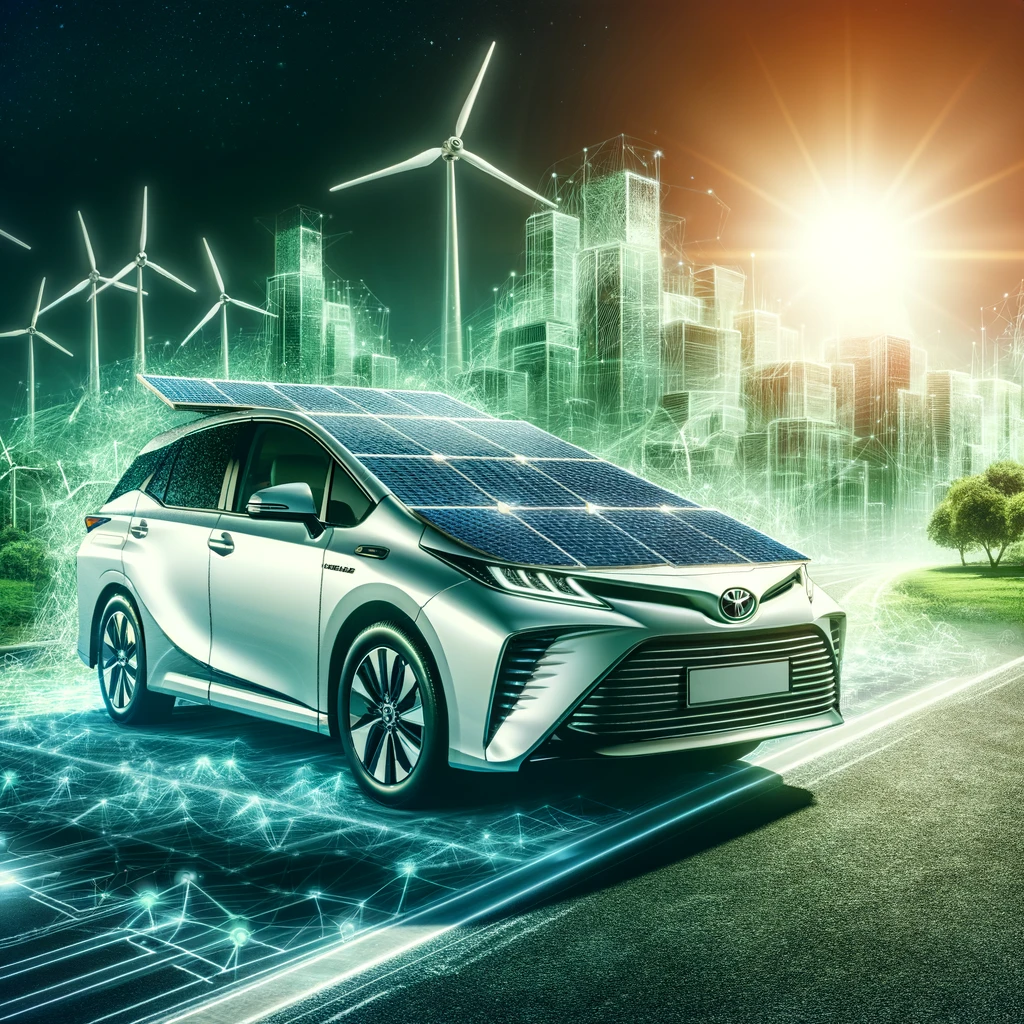
Today’s Hybrid Landscape
Modern hybrid cars for sale are diverse, spanning from the economical Toyota Hybrid Prius Prime, which boasts impressive mileage, to the luxurious Mercedes-Benz GLE 350de with its robust electric-only range. And let’s not overlook the adventurous types — the RAV4 Toyota Hybrid brings ruggedness to the eco-friendly domain.
Types Unveiled | Hybrid cars for sale
Let’s break down the categories:
- Parallel Hybrids: The norm in hybrid technology, these vehicles, like the latest Honda Accord Hybrid, operate by alternating between the engine and electric motor, or using both for a power boost.
- Mild and Micro Hybrids: These vehicles, such as the Audi Q5 TFSI e, offer a gentle push to the engine with their battery, aiding fuel efficiency without the full electric drive capability.
- Plug-In Hybrids (PHEVs): Offering the best of both worlds, PHEVs like the Ford Escape Plug-In can drive on electric power alone for daily commutes and switch to gas for longer journeys.
- Series Hybrids: A bit rarer, these, like the BMW i3 REx, use the gas engine primarily to recharge the battery, giving priority to electric drive.
Hybrid cars for sale: For an in-depth guide to transporting your new purchase, Nationwide Auto Transportation has you covered with their Car Buyers Auto Transport services. And if you’re curious about the electric side of eco-friendly driving, don’t miss the insights on Used Electric Cars. Or perhaps you’re considering a different type of vehicle? Explore your options at Nationwide Auto Transportation’s Car Types.
The Hybrid Cars for Sale Table | Compare Your Options
| Hybrid Type | Example Model | Key Feature |
|---|---|---|
| Parallel | Honda Accord Hybrid | Balance of power and efficiency |
| Mild | Audi Q5 TFSI e | Subtle battery boost |
| Plug-In | Ford Escape Plug-In | Electric and gas versatility |
| Series | BMW i3 REx | Electric-focused with gas backup |
Before you decide on the perfect hybrid match, consider checking out Car and Driver for the latest reviews and eco-vehicle trends. With informed decisions and a touch of style, buying a hybrid can be your next great adventure on the road to sustainability.
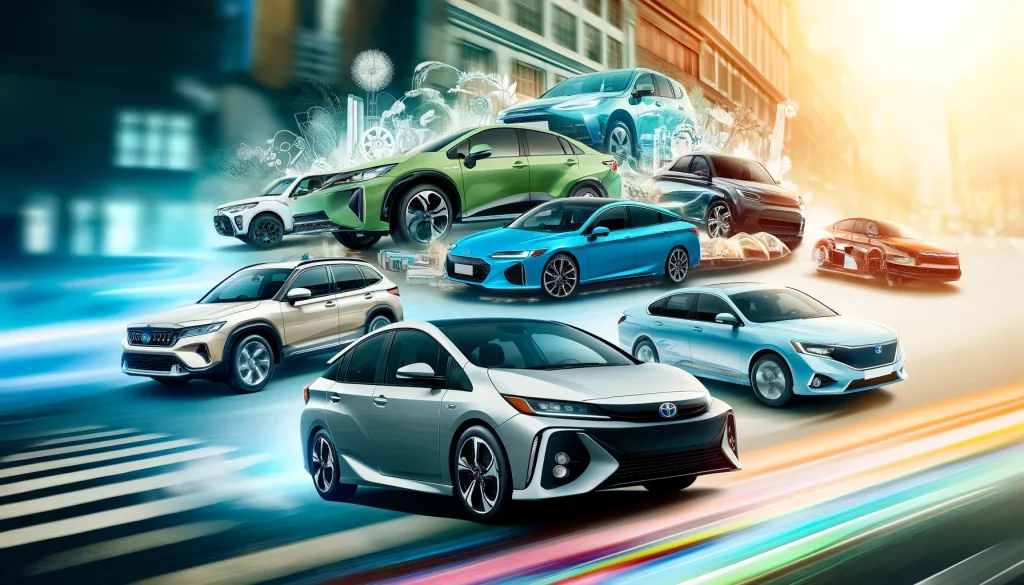
How Hybrid Cars Work | The Basics
Should I buy a hybrid or electric car? When you buy a hybrid, you’re investing in smart tech that blends gas and electricity for your ride. Here’s the rundown:
- Electric Launch: At a standstill or low speeds, say hello to the electric motor. It’s your smooth, silent start-up hero.
- Gas Engine’s Turn: Hit 35-40 mph? The gasoline engine steps up, taking over while giving the battery a little R&R.
- Regenerative Braking: Ease off the pedal downhill, and your hybrid says ‘Thanks!’ by charging its battery.
The Drive Dynamics
Hybrids flex their muscles with versatility:
- All-Wheel Agility: Some hybrids power all four wheels, offering stability and traction when you need it most.
- Transmission Talk: CVTs are common, but if they’re not your jam, luxury hybrids with conventional gears have got your back.
The Efficiency Edge
Why hybrids shine:
- Instant Oomph: Electric motors = instant torque. Translation? Zippy starts, no lag.
- Highway Hero: Gasoline engines love the open road, making long trips more fuel-efficient.
For newbies ready to buy their first eco-friendly ride, check out this first-car buyer’s guide. And if you’re snagging a hybrid from an auction, understand your shipping options with Nationwide Auto Transportation.
Curious about the latest hybrid models and their eco-savvy tech? Dive into the details with resources like Edmunds, where you can compare models and efficiency stats.
Which Hybrids are the Most Efficient in 2024? | Hybrid cars available
When considering hybrid cars for sale for fuel efficiency, it’s essential to recognize that some models outshine others significantly. The 2024 market offers a variety of models that lead in efficiency, providing excellent options for those looking to reduce both fuel costs and environmental impact.
Top Performers in Hybrid Efficiency | hybrid vehicle sales
- Toyota Prius Prime: Leading the charge with an impressive 127 mpg-e, the Prius Prime blends exceptional fuel economy with the practicality Toyota Hybrids are known for (Autoblog).
- Kia Niro PHEV: This model offers a robust 108 mpg-e, making it a top contender for those who prioritize fuel efficiency without sacrificing style or space.
- Ford Escape Plug-In Hybrid: With a 101 mpg-e rating, the Escape PHEV combines SUV versatility with excellent fuel economy, ideal for family trips and more.
- Hyundai Ioniq 6: This vehicle stands out in the electric vehicle category but is notable for its hybrid-like efficiency at 140 mpg-e, appealing to those looking to maximize their eco-friendly investments.
Other Notable Mentions
- Toyota Hybrid: Camry and Corolla – Both models continue to offer reliable efficiency with up to 52 mpg and 50 mpg combined respectively, ideal for commuters and small families looking for dependable and economical transportation (TrueCar).
- Honda Accord Hybrid: With a slightly lower efficiency at 48 mpg, it still provides a balanced option for those looking for a midsize sedan that offers both comfort and economy.

SUVs and Luxury Options
For those who prefer SUVs or luxury vehicles but still want efficient hybrids:
- Lexus NX 450h+: Delivers luxury with efficiency at 84 mpg-e, combining high-end amenities with eco-friendly driving.
- Lincoln Corsair Grand Touring: This plug-in hybrid SUV offers 78 mpg-e and marries sleek design with cutting-edge technology.
For more detailed reviews and to compare these models based on your specific needs, sites like Edmunds and TrueCar provide comprehensive insights and buyer guides. These resources can help you find the perfect hybrid that fits your lifestyle and budget. Additionally, understanding your transport options for these eco-friendly vehicles is crucia. Learn more about vehicle shipping with Nationwide Auto Transportation’s guides on Best Electric Car Friendly States Explored | Your Guide [2024] and Women and Cars | The Achievements of Women in the Automotive Industry.

Evaluating Hybrid Cars | Pros and Cons
When you’re thinking about whether to buy a hybrid, understanding the full picture is crucial. Let’s break down how hybrids compare to traditional vehicles.

Advantages of Hybrid Cars
- Enhanced Fuel Efficiency: One of the primary reasons to buy a hybrid car is the significant fuel savings. Hybrids combine electric power with gasoline engines to minimize fuel use, which can lead to substantial cost savings over time.
- Environmental Benefits: Toyota Hybrid cars are ideal for reducing your carbon footprint. They emit less greenhouse gas and pollutants compared to their gasoline-only counterparts, making them a smarter choice for the environmentally conscious.
- Instant Acceleration: Thanks to electric motors, hybrids can provide quicker acceleration from a stop than many gasoline cars, offering a zippier and smoother ride.
- Ease of Use: Operating a hybrid vehicle is similar to driving a conventional car but with the added advantage of automatic switching between gas and electric power to optimize efficiency.
- Tax Incentives: Some regions offer tax breaks for owning a hybrid, which can partially offset the higher initial cost.
- Reliability on the Road: Unlike fully electric vehicles, standard hybrids don’t need to be plugged in; they recharge their batteries through regenerative braking and the gasoline engine, ensuring you can keep driving as long as there is gas in the tank.

Disadvantages of Hybrid Cars
- Higher Initial Cost: Generally, hybrids cost more than their non-hybrid counterparts. The price premium can be up to 15%, which might be a significant barrier for some buyers.
- Reducing Tax Incentives: The availability of tax incentives for hybrid vehicles is decreasing, which could affect the overall cost-effectiveness of buying a hybrid.
- Battery Replacement Costs: If you opt for a used hybrid, the battery may need to be replaced eventually, which can be costly — typically around $3,000 outside of warranty.
- Maintenance Expenses: While daily running costs are lower, maintenance for a hybrid can be more expensive due to the complexity of hybrid systems and the need for specialized service.
Hybrid vs. Gasoline Cars
To give you a clearer picture, here’s how hybrid and gasoline cars stack up in key areas:
| Aspect | Hybrid Cars | Gasoline Cars |
|---|---|---|
| Initial Cost | Higher initial investment | More affordable upfront |
| Fuel Efficiency | Excellent efficiency (up to 58 mpg) | Less efficient (varies widely) |
| Environmental Impact | Lower emissions, cleaner driving | Higher emissions |
| Maintenance | Potentially higher maintenance costs | Typically lower maintenance costs |
| Dependability | Good with battery, no need to plug in | Reliable, less complex technology |
| Tax Incentives | Decreasing but still available in places | Few incentives unless eco-focused |
For further details on regulations and standards that may affect your decision, consider visiting the Federal Motor Carrier Safety Administration (FMCSA) and the Department of Transportation (DOT), which provide insights into vehicle safety and environmental standards.
Reflect on these points to determine if a Toyota hybrid meets your needs and lifestyle, not just today but for the duration you intend to own the vehicle. And remember, for unique or specialty vehicle purchases like a Porsche or classic car, check out Nationwide Custom Car Transport for safe and efficient transport solutions.
How Do Hybrid Cars Compare With Electric Cars?
When deciding between a hybrid (Toyota hybrid included), and an electric vehicle (EV), understand the fundamental differences and how they can impact your daily life.
Hybrid vs. Electric | Power and Performance
Hybrid Cars for sale: Hybrids use a combination of an electric motor and a gasoline engine. The electric motor can power the car at low speeds and supplement the gasoline engine when more power is needed, which is especially useful for improving fuel economy and reducing emissions. Popular models include the Toyota Prius and Honda Accord Hybrid.
Electric Cars: EVs operate exclusively on electric power, stored in batteries that are recharged through an external power source. This design eliminates any emissions during operation, making EVs more environmentally friendly than even the cleanest hybrids. Notable examples include the Tesla Model 3 and the Nissan Leaf.
Environmental Impact and Energy Use

Emissions: EVs have a clear advantage as they produce zero tailpipe emissions. In contrast, hybrids, while significantly cleaner than traditional gas cars, still emit some pollutants when the gasoline engine is running.
Energy Sources: EVs rely entirely on electricity, which can be generated from renewable sources. This makes them greener options, particularly in regions where the power grid is fed by renewables like solar or wind. Hybrids, however, will always require gasoline to some extent.
Convenience and Usability
Charging vs. Fueling: EVs need to be charged, usually at home or public charging stations, which can take anywhere from 30 minutes to several hours depending on the charging setup and the vehicle’s capabilities. Hybrids, on the other hand, can be refueled quickly at any gas station and many newer models don’t need to be plugged in at all.
Range: One major advantage of hybrids is their range and refueling convenience, thanks to their gasoline engines. EVs, while improving, typically have shorter ranges and rely on a network of charging stations, which can pose a problem during long trips or in areas with few chargers.
For more in-depth comparisons and the latest environmental ratings, visiting the Environmental Protection Agency (EPA) and reliable energy sources like Energy Information Administration (EIA) can provide valuable insights into the impact of these technologies on both your wallet and the planet.
Both hybrids and EVs offer significant benefits over traditional gasoline vehicles in terms of environmental impact and fuel consumption. The choice between them will depend on your specific needs, such as driving habits, budget for upfront costs versus long-term savings, and considerations for range and charging infrastructure. By comparing these aspects, you can determine which vehicle type best aligns with your lifestyle and sustainability goals.
How Long Do Hybrid Cars Last?

Durability of Hybrids: Like their gasoline counterparts, hybrids can last many years with proper care. Today’s hybrids come with warranties that often include coverage for crucial components like the electric motor and battery—some up to 150,000 miles. This longevity is bolstered by advancements in hybrid technology, which enhance durability and reliability.
Transferable Warranties: When buying a used Toyota hybrid (or another brand), it’s comforting to know that these warranties generally transfer to subsequent owners, providing additional security for your investment.
For a deeper dive into what affects the lifespan of hybrid cars and how to maintain them, check the U.S. Department of Energy’s website for comprehensive resources.
How Much Maintenance Do Hybrid Cars Need?
Maintenance Similarities and Differences: Generally, hybrids require maintenance similar to standard gasoline cars. However, because hybrids feature advanced technology, certain repairs might be costlier. The integration of electric motors and battery systems can require specialized care, which might add to maintenance expenses.
To help estimate these costs, consider utilizing tools and information from the Environmental Protection Agency (EPA), which offers resources on vehicle efficiency and maintenance.
Can Hybrid Cars Be Used For Long Distance Travel?
Long-Distance Viability: Contrary to common misconceptions, hybrids are quite capable of long-distance travel. Their dual power sources—electric motor and gasoline engine—allow them to operate efficiently on long journeys without the range anxiety associated with EVs.
Fueling Flexibility: If a hybrid’s battery depletes while traveling, the gasoline engine continues to operate, ensuring you can reach your destination as long as there is fuel in the tank.
Considering a hybrid for interstate travel or need to transport one? Nationwide Auto Transportation can provide detailed logistics and free quotes for transporting your vehicle safely.
Is It Easy to Charge Hybrid Cars?
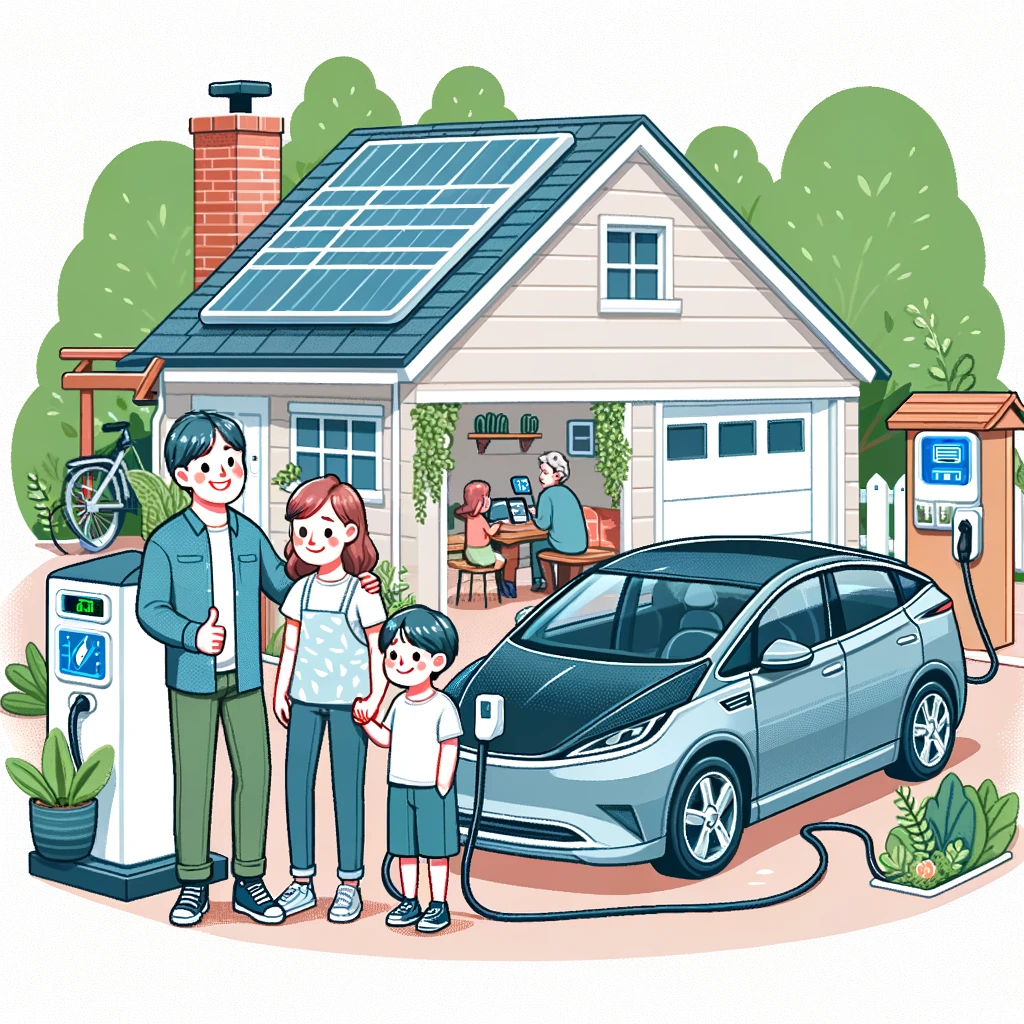
Charging Made Simple: Charging a hybrid depends on the type:
- Regular Hybrids: These recharge their batteries through driving activities like braking; thus, they don’t need to be plugged in.
- Plug-In Hybrids (PHEVs): These require charging via an outlet or charging station, which can be done overnight at home or at public stations during day trips.
For newcomers to plug-in hybrids, consider browsing ChargePoint’s network to locate convenient charging stations and plan your routes accordingly.
Are Hybrid Cars Able to Save Energy?
Efficiency and Design: Hybrids are designed to optimize energy use. Their regenerative braking systems convert kinetic energy into electric power, which is used to recharge the battery. Additionally, the aerodynamic design of vehicles like the Toyota Prius helps reduce drag and increase overall efficiency, enhancing their ability to save energy over traditional cars.
Can Hybrid Cars Save the Environment?
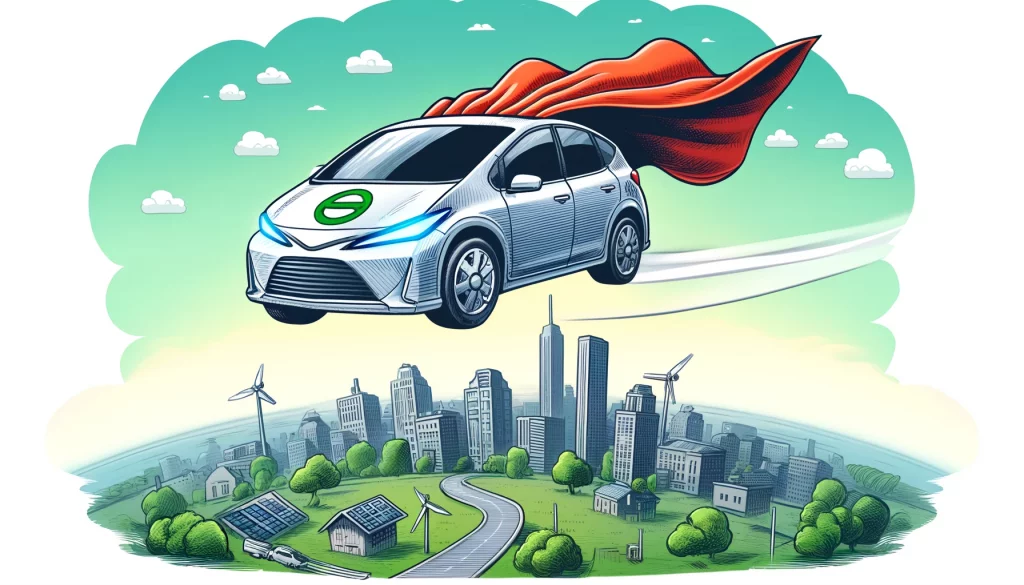
Eco-Friendly Benefits: Hybrids play a significant role in reducing greenhouse gas emissions compared to standard gasoline vehicles. They are a practical choice for drivers looking to decrease their environmental impact.
Considerations: While hybrids are more environmentally friendly, they are not entirely impact-free. The production and disposal of battery materials can contribute to environmental harm. However, advancements in recycling technology and cleaner production methods are continually reducing this impact.
Is It Worth Buying a Hybrid Car?
What is the Price Of a Hybrid Car? Cost vs. Benefit: Hybrids might cost more upfront than conventional cars, but they often offer savings through lower operational costs and tax incentives. They also provide a comfortable driving experience and have a lower environmental impact.
Lifestyle Fit: Before buying a hybrid, consider your driving needs and whether the benefits align with your lifestyle. For those with access to charging facilities and who drive long distances regularly, a hybrid can be a particularly wise choice.
Pondering the purchase of a hybrid vehicle? Start by visiting educational resources like the EPA’s guide to buying a hybrid for the latest data and tips to make an informed decision.
Top Hybrid Cars to Consider this Year
When you’re considering to buy a hybrid car, knowing which models offer the best blend of price, features, and efficiency can make your decision easier. Here’s a snapshot of the top sellers on the market:
Best Hybrid Models for Your Money
- 2024 Toyota Prius Prime
- Price: Starting at $28,220
- Features: Up to 133 MPGe, advanced driver-assistance systems, solar roof for additional battery charging.
- 2024 Honda Accord Hybrid
- Price: Starting at $26,370
- Features: Up to 48 MPG combined, spacious interior, responsive infotainment system.
- 2024 Hyundai Sonata Hybrid
- Price: Starting at $27,750
- Features: Up to 54 MPG combined, sleek design, robust safety features.
- 2024 Ford Escape Hybrid
- Price: Starting at $28,030
- Features: Up to 44 MPG combined, all-wheel drive option, versatile cargo space.
- 2024 Toyota RAV4 Hybrid
- Price: Starting at $29,575
- Features: Up to 40 MPG combined, rugged off-road capabilities, spacious for families.
These models stand out for their efficiency and the comprehensive packages they offer, making them excellent choices for various needs and budgets.
Choose the Right Hybrid for You | Ship it With Nationwide Auto Transportation

Before making a purchase, consider how a hybrid fits into your lifestyle. Evaluate the balance between upfront costs and long-term savings, and think about environmental impact and daily usability. Here’s why contacting a professional for shipping your new hybrid can enhance your purchase experience:
- Seamless Door-to-Door Delivery: Learn more about stress-free car delivery from Nationwide Auto Transportation’s door-to-door service.
- Choosing the Right Carrier: Make an informed choice by understanding what to look for in a car carrier with this helpful guide from Nationwide Auto Transportation.
- Special Discounts for Heroes: If you’re in the military, check out the benefits available through Nationwide’s Military Auto Transport.
- Understanding Car Shipping: Get a comprehensive look at the process of shipping a car with this detailed article from Nationwide Auto Transportation.
- Open Car Transport Options: Discover the advantages of open car transport and see if it’s right for you by visiting Nationwide Auto Transportation.
- Request a Quote: Ready to move forward? Request a free, no-obligation quote for shipping your hybrid car here.
Are you ready to make the eco-friendly switch with a hybrid car? Contact Nationwide Auto Transportation today to ensure your new vehicle is delivered safely, efficiently, and without any hassle. Whether you’re buying locally or out of state, we make it easy to bring your new hybrid right to your doorstep. Get your free quote now and join the green revolution with style and confidence!

Hybrid Car for Sale FAQs
Should I Buy a Hybrid Car?
- Yes, if you prioritize fuel efficiency and environmental friendliness. Hybrids can offer significant savings on fuel and reduce emissions.
Should I Buy a Hybrid or Gas Car?
- Choose a Toyota hybrid for better fuel economy and lower emissions. Opt for a gas car if upfront cost is a major concern and you have limited access to charging options.
Is a Toyota Hybrid SUV a Good Choice?
- Hybrid SUVs are excellent for those needing more space and capability while still wanting to maintain efficiency.
Why Buy a Hybrid Car?
- For the balance of enhanced fuel efficiency, reduced emissions, and potential tax incentives.
For a comprehensive look at why hybrids are worth it, visit Nationwide Auto Transportation’s guide to choosing a car carrier, which includes tips on selecting the right vehicle for your needs.



